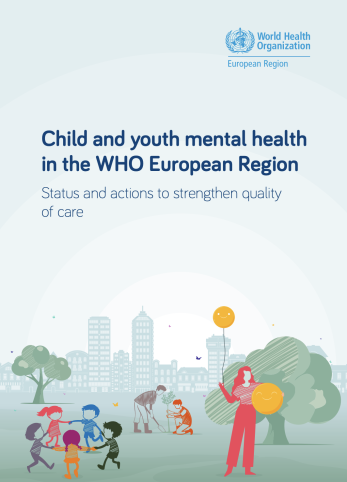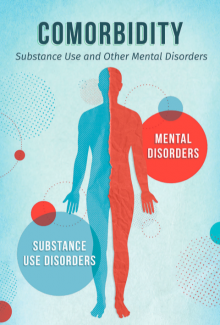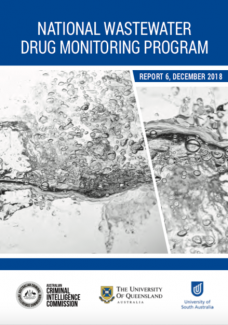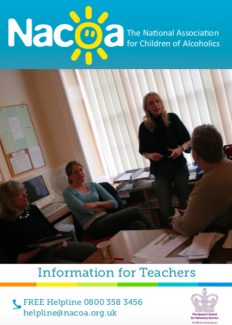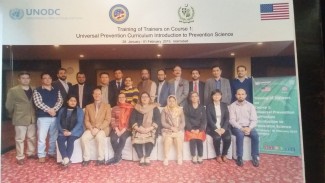
تلاش
UNIATF: Call for Nominations for the Task Force Awards 2019
Inspire Freedom Campaign - IOGT International
The Inspire Freedom Campaign – Together for women and girls – every 25th is IOGT International’s flagship community campaign to promote the rights of girls and women and to end gender-based violence, by preventing alcohol violence.
The...
Xchange Prevention Registry
Xchange is an online registry of evidence-based prevention programmes. In its first phase, the registry will make available manualised interventions that European evaluation studies show have beneficial outcomes relating to substance use...
Claremont’s UPC Media Summer Institute Programme
Comorbidity Infographic and Report
The term “comorbidity” describes two or more disorders or illnesses occurring in the same person. They can occur at the same time or one after the other. Comorbidity also implies interactions between the illnesses that can worsen the course...
Effectiveness Bank Analysis: Feedback on Client Progress among Most Effective Ways to Improve Outcomes
Findings amalgamated for the American Psychological Association show that providing therapists real-time feedback from the client (including substance use clients) on their progress and how to improve it is among the most effective ways...
Magnitude of Substance Use in India
National Wastewater Drug Monitoring Program
Wastewater analysis is widely applied internationally as a tool to measure and interpret drug
use within national populations, with the current national program in Australia representing world best practice.
Effectiveness Bank Analysis: Fundamental Rule for Therapists: Know and Be Who You Are
Message from an amalgamation of research findings for the American Psychological Association is that conveying genuineness and authenticity - at least during therapy, being and giving of yourself as an integrated character - is one way...
Three Days Training on Universal Treatment Curriculum (UTC) 1 & HIV/Aids Prevention at Sialkot
Three Days Training on Universal Treatment Curriculum (UTC) 1 & HIV/Aids Prevention on 8-10 February, 2019 organized by M A Jinnah Foundation (Regd) in collaboration with Mian Afzal Trust Hospital as Colombo Plan recognized Education...
کم خطرے والی شراب پینے کا سوشل میڈیا کیلنڈر
کینیڈا میں تعطیلات، پارٹیوں اور تعطیلات کے دوران شراب نوشی میں اضافہ ہوتا ہے۔
کینیڈین سینٹر آن سبسٹنس یوز اینڈ ایڈکشنز نے سوشل میڈیا گرافکس کا ایک کیلنڈر تیار کیا ہے تاکہ نوجوانوں کو یاد دلایا جا سکے کہ اگر وہ شراب پینے کا ارادہ رکھتے ہیں...
Information for Teachers
In classrooms across the UK 1 in 5 children are carrying the burden of someone else’s drinking.
The National Association for Children of Alcoholics have developed a new resource to help teachers identify children affected by their parent's...
Smoking During Pregnancy , Stigma and Secrets
There is significant evidence to suggest that smoking while pregnant is harmful to the baby increases the risk of miscarriage, and premature birth. The Statistics on smoking, England: 2018 compendium report shows that in 2017-18, 10.8% of...
National Cannabis Survey, fourth quarter 2019
Statistics Canada has been conducting the National Cannabis Survey every three months since February 2018.
The main objective of the NCS is to monitor changes in cannabis-related behaviours during the period preceding and following...
Survey: The National Centre for Clinical Research on Emerging Drugs
The purpose of this survey is to seek your opinions on areas for the treatment of substance use disorder due to methamphetamine and other emerging drugs of concern that would benefit from the conduct of clinical research.
Emerging drugs of...
Effectiveness Bank Analysis: Abandon Treatment Referral as a Crime-Prevention Tactic?
At issue was whether by referring heroin users to treatment, probation services in England would protect them from fatal overdose and prevent drug-related crime. Yes to one, but not the other, were the answers; unexpectedly, crime went up...
UPC Coordinator's Series - Introduction to Prevention Science 28 January - 1 February 2019, Islamabad, Pakistan
Successfully completed Training of Trainers on Course 1: Universal Prevention Curriculum (UPC) Coordinators Series -Introduction to Prevention Science 28 January - 1 February 2019, Islamabad, Pakistan
Did you know that INL fights drugs...
Mental Health Professionals’ Views on Smoke-Free Policy
The prevalence of smoking within the general population is in decline. However, the number of people with mental health issues who smoke remains high.
A recent study has examined mental health care practitioners approach to addressing...
Statistics on Alcohol - England 2019
NHS Digital has released the latest statistical report on alcohol in England. The publication includes a range of information on alcohol use and misuse by adults and children.
The report presents findings on:
- Alcohol relate hospital...
Implementing SBIRT in Rural Clinics: A How-to Guide
Share the Knowledge: ISSUP members can post in the Knowledge Share – Sign in or become a member

